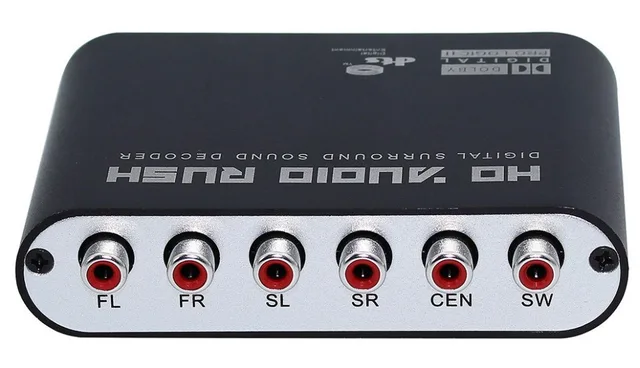DTS 5.1 Surround Sound Test HD 5.1 THX Surround Sound Test Note: The overall quality of the sounds you hear is always depended to the decoder. Furthermore, most video sharing services (YouTube included) do not support Dolby Digital or DTS.
DTS-HD Master Audio (DTS-HD MA; known as DTS++ before 2004[1]) is a multi-channel, lossless audio codec developed by DTS as an extension of the lossyDTS Coherent Acoustics codec (DTS CA; usually itself referred to as just DTS). Rather than being an entirely new coding mechanism, DTS-HD MA encodes an audio master in lossy DTS first, then stores a concurrent stream of supplementary data representing whatever the DTS encoder discarded. This gives DTS-HD MA a lossy 'core' able to be played back by devices that cannot decode the more complex lossless audio. DTS-HD MA's primary application is audio storage and playback for Blu-ray Disc media; it competes in this respect with Dolby TrueHD, another lossless surround format. DTS-HD MA has enjoyed the greater share of this market since 2010,[2] with the notable exception of the TrueHD-encoded Dolby Atmos spatial surround format, which is more popular than DTS's competing DTS:X (encoded with DTS-HD MA).

Specifications[edit]
DTS-HD MA can store up to 8 discrete channels of audio (7.1 surround) at up to a 24 bit sample depth and 192 kHz sampling frequency (96 kHz for 6.1 or 7.1 surround).[3] Although DTS-HD MA, and the related DTS-HD, allow virtually any number of channels in the abstract,[4] these limits are imposed for practical reasons of limited storage and bitrate availability. A DTS-HD MA bitstream may have a bitrate no greater than 24.5 Mbps (instantaneous), of which no greater than 1.5 Mbps may be lossy DTS (as per the DTS CA specification).[5]
The Blu-ray specification stipulates DTS-HD MA as an optional codec, which means that some Blu-ray hardware may not decode it. This is the reason for the bifurcated nature of a DTS-HD MA audio stream; DTS CA, unlike its MA extension, is mandatory, so a player that is not MA-capable can automatically default to an MA-encoded disc's base DTS stream and simply ignore the supplementary data.[5]
DTS-HD MA is the encoding format for DTS:X, an object-based surround-sound format that competes with Dolby Atmos. A DTS-HD MA bitstream carrying DTS:X can contain up to 9 simultaneous sound objects, which are dynamically mapped to a user's speaker system during playback, unlike the rigid number and placement of speakers required by channel-based surround (a DTS marketing executive referred to DTS:X in an interview as 'whatever.1').[6]
- 'Surround Sound' conservation since 2011! Welcome to DTS by J4J From the tab above you can check out the 'Surround Sound List' for a wide variety of 5.1 DTS CD upmixes, plus 5.1, 4.1 and 4.0 DTS CD conversions from past to present.
- DTS is the abbreviation of 'Digital Theatre System', which means 'digital cinema system'. Technically speaking, DTS is completely different from other sound processing systems including Dolby Digital. DTS is usually 5.1 or 7.1, home theater lossy encoded audio format created by Digital Theater Systems.
Encoding process[edit]
DTS-HD MA is encoded in three steps. First, the audio master is fed to a DTS CA encoder, which generates the core (lossy) audio stream. Next, this lossy audio is decoded and compared to the master, with 'residual' data being recorded wherever the two differ. Finally, the residual data is compressed losslessly and merged with the core into one bitstream. A DTS-HD MA decoder simply performs this process in reverse.[7]
DTS-HD MA audio, including DTS:X audio, can be created and edited using DTS's DTS:X Encoder Suite. The DTS-HD Master Audio Suite served the same function before the introduction of DTS:X, and can still be used for DTS-HD MA that does not carry DTS:X.[8]
AV transport[edit]
DTS-HD Master Audio may be transported to AV receivers in 5.1, 6.1, or 7.1 channels, in full quality, in one of three ways depending on player and/or receiver support:[7]
- Over 6, 7 or 8 RCA connectors as analog audio, using the player's internal decoder and digital-to-analog converter (DAC).
- Over HDMI 1.1 (or higher) connections as 6-, 7-, or 8-channel linear PCM, using the player's decoder and the AV receiver's DAC.
- Over HDMI 1.3 (or higher) connections as the original DTS-HD Master Audio bitstream, with decoding and DAC both done by the AV receiver. (This is the transport mode required for DTS:X playback.)
TOSLINK does not have the bandwidth to carry DTS-HD MA (or PCM in more than 2 channels). A player using TOSLINK audio may output DTS-HD MA as either lossy DTS (which TOSLINK can carry) or downmixed stereo PCM. Best programs for imac.
References[edit]
- ^Thomson, Kristin (2004-11-01). 'DTD Unveils DTS-HD Brand For High Definition Media Formats'. Retrieved 2009-05-06.
- ^'DTS-HD Master Audio Becoming the Blu-ray Standard'. Blu-ray Stats News Log. 2010-01-15. Retrieved 2020-12-03.
- ^'DTS-HD Master Audio Specifications (DTS-HD Master Audio™ - DTS)'. January 10, 2012. Archived from the original on January 10, 2012. Retrieved January 10, 2012.
- ^Morrison, Geoffrey (September 23, 2009). 'Dolby Pro Logic IIz vs. Audyssey DSX vs. DTS'. Home Entertainment. Archived from the original on 2010-10-10. Retrieved November 15, 2010.
DTS-HD can natively support over 2,000 individual channels, so according to DTS adding any number of discrete height channels would be easy.
- ^ abDeBoer, Clint (2007-06-04). 'DTS Demos Master Audio via PC'. Audioholics Online A/V Magazine. Retrieved 2019-01-01.
DTS-HD Master Audio delivers sound that is bit-for-bit identical to the studio master. It can deliver audio at variable bit rates which are significantly higher than standard DVDs. DTS-HD Master Audio can provide up to 7.1 audio channels at a 96k sampling frequency / 24-bit depth or 5.1 audio channels at 192 kHz that are identical to the original master. The DTS-HD Master Audio bit stream also contains the DTS 1.5 Mbps core for backwards compatibility with existing DTS-enabled home theater systems, and delivery of 5.1 channels of sound at twice the resolution found on most standard DVDs.
- ^Waniata, Ryan (2015-04-13). 'Lookout Dolby Atmos, DTS just entered the next era of surround sound with DTS:X'. Digital Trends. Retrieved 2016-06-09.
- ^ ab'DTS-HD Audio: Consumer White Paper for Blu-ray Disc Applications'(PDF). November 2006. Retrieved 2020-01-24.
- ^'DTS-HD Master Audio Suite(TM)'. Archived from the original on 2018-03-04. Retrieved 2019-01-01.

How To Configure And Test 5.1 Surround Sound On Windows 10 ..
/Dts-dig-ent_logo-wc-58e7bdff5f9b58ef7e13513f.jpg)
What Is Dts 5.1
Dts 5.1 Soundbar
:max_bytes(150000):strip_icc()/magnavox-mdr-557-rear-arrows-xxx-5b574e104cedfd003744de58.jpg)
Specifications[edit]
DTS-HD MA can store up to 8 discrete channels of audio (7.1 surround) at up to a 24 bit sample depth and 192 kHz sampling frequency (96 kHz for 6.1 or 7.1 surround).[3] Although DTS-HD MA, and the related DTS-HD, allow virtually any number of channels in the abstract,[4] these limits are imposed for practical reasons of limited storage and bitrate availability. A DTS-HD MA bitstream may have a bitrate no greater than 24.5 Mbps (instantaneous), of which no greater than 1.5 Mbps may be lossy DTS (as per the DTS CA specification).[5]
The Blu-ray specification stipulates DTS-HD MA as an optional codec, which means that some Blu-ray hardware may not decode it. This is the reason for the bifurcated nature of a DTS-HD MA audio stream; DTS CA, unlike its MA extension, is mandatory, so a player that is not MA-capable can automatically default to an MA-encoded disc's base DTS stream and simply ignore the supplementary data.[5]
DTS-HD MA is the encoding format for DTS:X, an object-based surround-sound format that competes with Dolby Atmos. A DTS-HD MA bitstream carrying DTS:X can contain up to 9 simultaneous sound objects, which are dynamically mapped to a user's speaker system during playback, unlike the rigid number and placement of speakers required by channel-based surround (a DTS marketing executive referred to DTS:X in an interview as 'whatever.1').[6]
- 'Surround Sound' conservation since 2011! Welcome to DTS by J4J From the tab above you can check out the 'Surround Sound List' for a wide variety of 5.1 DTS CD upmixes, plus 5.1, 4.1 and 4.0 DTS CD conversions from past to present.
- DTS is the abbreviation of 'Digital Theatre System', which means 'digital cinema system'. Technically speaking, DTS is completely different from other sound processing systems including Dolby Digital. DTS is usually 5.1 or 7.1, home theater lossy encoded audio format created by Digital Theater Systems.
Encoding process[edit]
DTS-HD MA is encoded in three steps. First, the audio master is fed to a DTS CA encoder, which generates the core (lossy) audio stream. Next, this lossy audio is decoded and compared to the master, with 'residual' data being recorded wherever the two differ. Finally, the residual data is compressed losslessly and merged with the core into one bitstream. A DTS-HD MA decoder simply performs this process in reverse.[7]
DTS-HD MA audio, including DTS:X audio, can be created and edited using DTS's DTS:X Encoder Suite. The DTS-HD Master Audio Suite served the same function before the introduction of DTS:X, and can still be used for DTS-HD MA that does not carry DTS:X.[8]
AV transport[edit]
DTS-HD Master Audio may be transported to AV receivers in 5.1, 6.1, or 7.1 channels, in full quality, in one of three ways depending on player and/or receiver support:[7]
- Over 6, 7 or 8 RCA connectors as analog audio, using the player's internal decoder and digital-to-analog converter (DAC).
- Over HDMI 1.1 (or higher) connections as 6-, 7-, or 8-channel linear PCM, using the player's decoder and the AV receiver's DAC.
- Over HDMI 1.3 (or higher) connections as the original DTS-HD Master Audio bitstream, with decoding and DAC both done by the AV receiver. (This is the transport mode required for DTS:X playback.)
TOSLINK does not have the bandwidth to carry DTS-HD MA (or PCM in more than 2 channels). A player using TOSLINK audio may output DTS-HD MA as either lossy DTS (which TOSLINK can carry) or downmixed stereo PCM. Best programs for imac.
References[edit]
- ^Thomson, Kristin (2004-11-01). 'DTD Unveils DTS-HD Brand For High Definition Media Formats'. Retrieved 2009-05-06.
- ^'DTS-HD Master Audio Becoming the Blu-ray Standard'. Blu-ray Stats News Log. 2010-01-15. Retrieved 2020-12-03.
- ^'DTS-HD Master Audio Specifications (DTS-HD Master Audio™ - DTS)'. January 10, 2012. Archived from the original on January 10, 2012. Retrieved January 10, 2012.
- ^Morrison, Geoffrey (September 23, 2009). 'Dolby Pro Logic IIz vs. Audyssey DSX vs. DTS'. Home Entertainment. Archived from the original on 2010-10-10. Retrieved November 15, 2010.
DTS-HD can natively support over 2,000 individual channels, so according to DTS adding any number of discrete height channels would be easy.
- ^ abDeBoer, Clint (2007-06-04). 'DTS Demos Master Audio via PC'. Audioholics Online A/V Magazine. Retrieved 2019-01-01.
DTS-HD Master Audio delivers sound that is bit-for-bit identical to the studio master. It can deliver audio at variable bit rates which are significantly higher than standard DVDs. DTS-HD Master Audio can provide up to 7.1 audio channels at a 96k sampling frequency / 24-bit depth or 5.1 audio channels at 192 kHz that are identical to the original master. The DTS-HD Master Audio bit stream also contains the DTS 1.5 Mbps core for backwards compatibility with existing DTS-enabled home theater systems, and delivery of 5.1 channels of sound at twice the resolution found on most standard DVDs.
- ^Waniata, Ryan (2015-04-13). 'Lookout Dolby Atmos, DTS just entered the next era of surround sound with DTS:X'. Digital Trends. Retrieved 2016-06-09.
- ^ ab'DTS-HD Audio: Consumer White Paper for Blu-ray Disc Applications'(PDF). November 2006. Retrieved 2020-01-24.
- ^'DTS-HD Master Audio Suite(TM)'. Archived from the original on 2018-03-04. Retrieved 2019-01-01.
How To Configure And Test 5.1 Surround Sound On Windows 10 ..
What Is Dts 5.1
Dts 5.1 Soundbar
All materials on the site are provided for informational purposes only. After reading, remove the material and purchase licensed version
